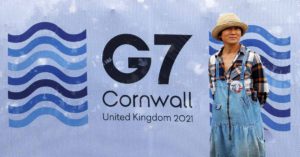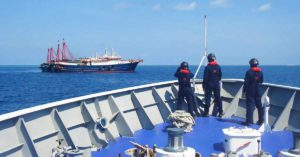SEN. Ana Theresia “Risa” Hontiveros filed Senate Resolution 659 urging the Marcos government to bring the 2016 arbitral award over the disputed South China Sea (SCS) and the alleged incursions of China in the West Philippines Sea (WPS) before the United Nations General Assembly (UNGA) this September. Hontiveros presented the resolution for approval last July 26. Senate President Juan Miguel Zubiri is confident that the Senate will approve the resolution in the coming weeks. Sen. Jinggoy Estrada and other senators are backing Hontiveros’ resolution.
In a July 27 interview with ANC, Senator Hontiveros claimed that the UN made the US comply with the International Court of Justice (ICJ) decision in Nicaragua v. US, ordering Washington to recompense Nicaragua over violations of territorial sovereignty. It seems this is one of the justifications being put forward by Hontiveros in her push to bring the 2016 arbitral tribunal award to the UNGA and, if possible, to the United Nations Security Council (UNSC).
The statements of Hontiveros should be taken with a grain of salt because these are misleading. Let me put some sense and perspective into Hontiveros’ claims and preachings.
Elucidation
As a proviso, the 2016 arbitral ruling did not denote the victory of sovereignty over the territorial and maritime claims of the Philippines in the disputed waters of the SCS. This means that the arbitral tribunal did not tackle matters related to territorial sovereignty over the disputed maritime features between the parties, which further implies that the tribunal did not decide who owned the maritime features located in the SCS, such as the Spratly islands, that are claimed by China and the Philippines and by Vietnam and Malaysia as well. Similarly, the tribunal did not delimit (demarcate or set limits) any maritime boundaries between the Philippines and China in the SCS.
The award clarified the Philippines’ maritime entitlements in the West Philippine Sea. It acknowledged the damage to the marine ecosystem and resources caused by reclamations in the SCS. It even ruled that the surrounding waters of the Scarborough Shoal as traditional fishing grounds where Filipinos, Chinese and even Vietnamese can fish. It also stated that the shoal is a rock that cannot generate an exclusive economic zone (EEZ) because it cannot sustain life.
Another factual inaccuracy that needs to be clarified is that the award is not a Permanent Court of Arbitration (PCA) ruling. Although the PCA discharged and announced the ruling, the PCA only served as the registry (record office) or secretariat (a permanent administrative office that carries out substantive and administrative work) of the arbitral tribunal constituted under the United Nations Convention on the Law of the Sea (Unclos). Likewise, unlike the ICJ, the PCA is not a UN organization.
Realities
One of the many issues and dilemmas in the arbitral award is the issue of enforcement. In an anarchic international state system, where the world lacks any supreme authority or sovereign, meaning there is no world police force, the award is a “paper tiger.” It appears to be powerful or threatening but is, in fact, ineffectual. Thus, it is somehow difficult to enforce. This is the glaring reality.
Even if the arbitral award has the backing of an UNGA resolution, it would never have the guarantee of enforcement through UN mechanisms. Consisting of 193 members where one country has one vote, UNGA resolutions are, at best, “recommendations.” This means they have no binding power over member states. If the arbitral award is brought to the UNSC, it will also be shot down as China is a permanent member of the UNSC. Decision-making at the UNSC is by consensus, and permanent members like China can veto any resolution that goes against its sovereign interests.
Take the case of Nicaragua v. US in 1986. The ICJ ruled that the US violated international law by supporting the Contras in their rebellion against the Sandinistas and mining Nicaragua’s harbors. The case was decided in favor of Nicaragua and against the US by awarding reparations to Nicaragua.
However, the US refused to participate in the proceedings, arguing that the ICJ lacked jurisdiction to hear the case. The US walked out of the court after the jurisdictional decision was rendered but before the merits phase got under way. The US also blocked enforcement of the judgment through the UNSC by exercising its veto power and preventing Nicaragua from obtaining compensation.
The UNGA adopted four resolutions calling for “full and immediate compliance with the judgment of the ICJ, but the US, however, continued to claim that the ICJ did not have jurisdiction in the case and exercised its veto in the UNSC. Hence, Nicaragua failed to secure full US compliance with the judgment.
Therefore, the only way to enforce the arbitral ruling without the concession of China, if the Philippines insists, is to go to war. But at what cost, at whose expense and who would ultimately benefit? War is not an option in resolving the Philippines’ dispute and differences with China because no one would benefit. In a war, everyone loses one way or the other.
Another reality that Filipinos must contend with is the uneven balance of power, the blatant asymmetry of economic and military power between the Philippines and China, soft power projections and the increasing influence of China on the international stage. One should note that China’s soft power projections and influence worldwide have gained so much traction for decades.
Thus, when it comes to persuasion and influence between the Philippines and China, it is evident that China will win to its side many developing, least developed countries, and countries that are part of the Non-Aligned Movement, which is a large voting bloc in the UNGA.
Note that when the arbitral ruling was released, 147 countries ignored it, seven, including Taiwan, opposed it, and 33 acknowledged the ruling but did not call for compliance. Only the Group of Seven countries led by the United States, which stand to benefit from the ruling, wanted China to comply with the award. The US is not even a party to the Unclos. Does this not indicate what will happen when the Philippine government brings the arbitral ruling to the UNGA this September? Are we going to embarrass and humiliate the country once again in pushing for this arbitral ruling, which is a paper tiger in reality?
Vietnam’s military activities in WPS
On the other hand, Vietnam is beefing up militarization of the WPS. Based on an article published in The Manila Times last July 16, 2023, entitled “Vietnam beefs up militarization in WPS,” Vietnam has hired a private company to build an artificial island in the WPS as part of its militarization efforts in areas that it claims. The company was identified as the Airport Design and Construction Consultancy One Member Ltd. Liability Co. (ADCC), a top Vietnamese construction consultancy for aviation and airport engineering projects. Accordingly, the land features in the WPS that Vietnam will supposedly militarize include Hizon (Pearson) Reef, Pigeon (Tennent) Reef and Maskardo (Barque Canada) Reef. The Philippines also claim these features, as they are covered by its EEZ based on Unclos.
According to the article, Vietnam plans to build “a covert fortification, command fortification, firepower fortification, weapons storage fortification, traffic trench system, trench and related tactical items” in the territories mentioned. Accordingly, the Vietnamese government is ready to send people to these land features, where they will set up residences, and Vietnam will increase the presence of its fishermen in the “vicinity waters of the above reefs because it is not only good for developing maritime economy but also defending their sovereignty.”
On this note, it is imperative to know if Hontiveros, Zubiri, and the like, will also condemn Vietnam’s militarization of the WPS. Would they also bring this case to the UNGA this September? Vietnam’s militarization of WPS is not only a security threat but harms the claims of the Philippines over the Spratly islands. Hence, as senators of the republic, Hontiveros and others should and must also urge the Philippine government, the Department of Foreign Affairs, to make public responses to this issue, decry and denounce Vietnam’s military activities in the WPS. But why are these senators and the government quiet about this? The sound of silence is the most deafening sound on this issue. Is it not?
Source: The Manila Times
https://www.manilatimes.net/2023/07/29/opinion/columns/is-bringing-arbitral-award-before-unga-a-wise-move-what-about-vietnams-militarization-of-wps/1902867



